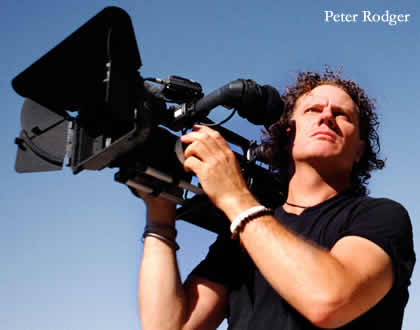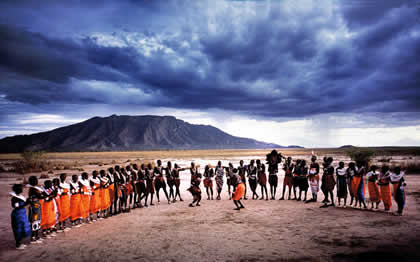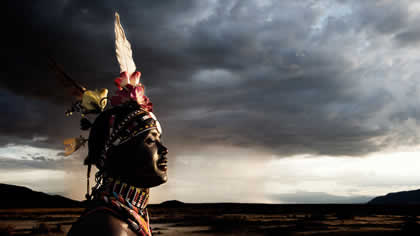In every corner of the world, there’s one question that can never be definitively answered, yet stirs up equal parts passion, curiosity, self-reflection and often wild imagination: “What is God?” Filmmaker Peter Rodger explores this profound, age-old query in the provocative non-fiction feature “Oh My God?”
This visual odyssey travels the globe with a revealing lens examining the idea of God through the minds and eyes of various religions and cultures, everyday people, spiritual leaders and celebrities. His goal: to give the viewer the personal, visceral experience of some kind of reasonable, meaningful definition of one of the most used–some might say overused–words in most every language.
Rodger’s quest takes him from the United States to Africa, from the Middle East to the Far East, where such fundamental issues as: “Did God create man or did man create God?, “Is there one God for all religions?” and “If God exists, why does he allow so much suffering?” are explored in candid discussions with the various Christians, Catholics, Muslims, Jews, Hindus, Buddhists and even atheists the filmmaker meets along the way. But maybe it’s former Beatle Ringo Starr who sums it up best here when he simply says, “God is love.” 
Bijan Tehrani: What initially motivated you to make Oh My God?
Peter Rodger: It actually came out of frustration more than anything else, so much had been happening in the news over the past several years and I became fed up with the schoolyard mentality that appeared to be happening across the board, where you had men flying planes into buildings, screaming god is great, or when you had the leader of the free world invading Iraq because “god told him too” , or where you have young women and young men who blow themselves up to buy themselves into heaven. It made me wonder what is going on here, so we went around the world asking people what the idea of God means to them we wanted to increase people’s knowledge of the world and also promote tolerance.
Bijan: How challenging was it when you started to go after this subject?
Peter: It was challenging on multiple levels, first of all It started very badly because I was a very successful advertising directors, so I stopped that completely and got together my camera equipment and headed off to Morocco. It turned out that the very same day was the day that a terrorist plot was thwarted in London. As the result when you were flying, you couldn’t take any hand luggage with you, which meant I couldn’t take cameras and crew equipment; all of the equipment was put on hold and when I arrived in Morocco everything had been stolen, including my toothbrush. Therefore I didn’t have a camera and there, I was in foreign country trying to make a documentary, I though that maybe this was a sign to quit. But then I decided that it was a sign to start again. The next challenge was  trying to figure out my story, what is God and what does he mean to different people?. After several interviews I realized that everyone was saying the same thing about God and the film was becoming very boring. I then realized that there is a difference between what man uses the word God for and what people believe God is.
trying to figure out my story, what is God and what does he mean to different people?. After several interviews I realized that everyone was saying the same thing about God and the film was becoming very boring. I then realized that there is a difference between what man uses the word God for and what people believe God is.
Bijan: Where there any situations that you felt threatened during the production?
Peter: I never felt threatened, and a lot of this was due to naivety, in the idea that you felt protected by the lens of the camera. In reality a camera is no protection shield like in Star Wars; it’s just a camera, in fact in draws attention to you. Also not being aware of the dangers that surrounded me in certain areas, for example we learned afterward that there was a terrorist group who planned to blow up our convoy in India, but at the time I didn’t fear it because I wasn’t aware of it.
Bijan: How did you come up with the visual style of the film?
Peter: I’m a visual nut, I was lucky to have been educated by my father who was a noted photographer; he taught me how to see and how to tell a story within a frame. I was always looking for metaphors in style, shape and light, through faces objects and landscapes. Of course the magic of it all is the collaboration with a great editor, John Hoyt, who shared my vision for the film. 
Bijan: I think that your experience with making commercials has helped you in making of the Oh my God. Because by making commercials you learn how to tell a story in a short period of time, would you agree with this?
Peter: In fact John Hoyt is an editor that I have used on several commercials. We talked about creating a good pace so that things would be pushed along, but still be entertaining.
Bijan: One thing that is very clear through the film is that you are not trying to pick a side, is this true?
Peter: The frustration of the filmmaking process was trying not to be objective. It is up to the viewer to form an opinion based on the information that I have given. Being objective is crucial is this kind of film, It was almost like I was an alien visiting a new planet and learning from the inhabitants, so its very important to be objective and that was my mantra.
Bijan: How has the reaction been to the film form religious groups and non-believers alike?
Peter: Quite surprising actually, faith based people has been very positive to the film, because it is not mocking God but only questions the idea of God. After watching the film it enables them to question their own ideas of God and when they see that there are people who also question the idea of God it can enable a healthy discussion, through discussion we learn and understand that we need to embrace and understand other human beings.

